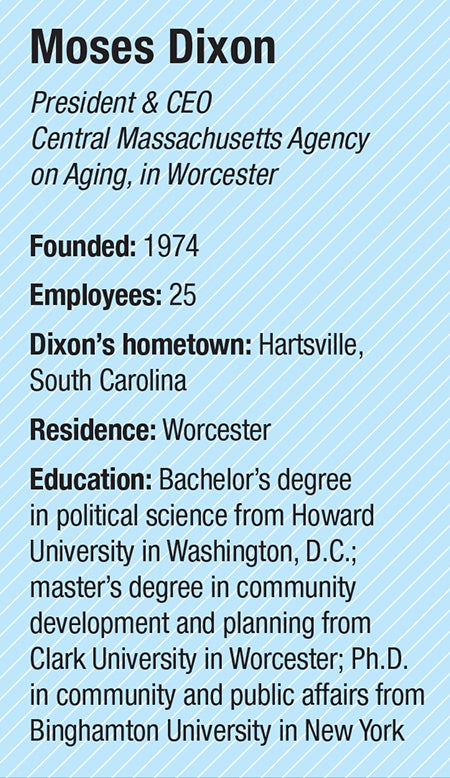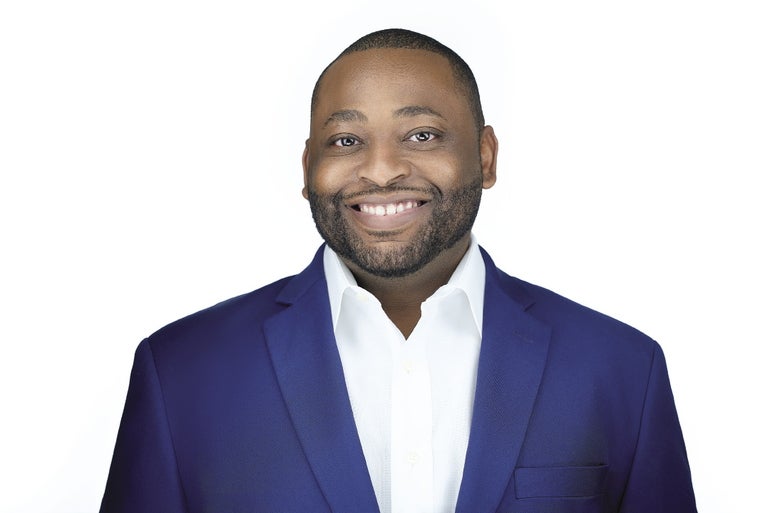In January, Dixon was named a 2024 presidential scholar, among 60 nationwide to participate in the ninth class of the leadership program collectively put on by the presidential centers for Presidents George W. Bush, Bill Clinton, George Bush, and Lyndon Johnson.
Get Instant Access to This Article
Subscribe to Worcester Business Journal and get immediate access to all of our subscriber-only content and much more.
- Critical Central Massachusetts business news updated daily.
- Immediate access to all subscriber-only content on our website.
- Bi-weekly print or digital editions of our award-winning publication.
- Special bonus issues like the WBJ Book of Lists.
- Exclusive ticket prize draws for our in-person events.
Click here to purchase a paywall bypass link for this article.
When Moses Dixon arrived in Worcester as a graduate student at Clark University, he was already a rising star in the community development and advocacy realms. As a young graduate of Howard University, Dixon learned how to get work done in the toughest climates: Capitol Hill during the passing of the Affordable Care Act. A legislative fellow for then Sen. Majority Leader Harry Reid (D-Nevada), the front-row seat taught Dixon priceless lessons he carried with him to Greater Worcester, where he’d ultimately lead advocacy for senior citizens with a focus on grandparents raising grandchildren.

In January, Dixon was named a 2024 presidential scholar, among 60 nationwide to participate in the ninth class of the leadership program based on the experiences of Presidents George W. Bush, Bill Clinton, George Bush, and Lyndon Johnson, Dixon is striving to show local leaders the plight of older adults facing challenges and is poised to help lead the same charge nationally, from his post at the Central Massachusetts Agency on Aging. After opening the Grandparents Raising Grandkids Resource Center in 2023, he shared his goals for the future.
What drives you in the work that you do, advocating for people in need?
I grew up very, very poor in South Carolina. I knew the only way to make people’s lives better was through advocacy and policy. Majoring in political science gave me an edge. I was involved in advocacy on campus at Howard University and in Washington D.C. I was in close proximity to where decisions are made impacting the nation. Growing up in a family where we didn’t have much but we always looked out for each other, I learned to support the community. My family instilled that in me.
When finishing my undergraduate degree, I had an amazing opportunity to be a legislative fellow for Sen. Harry Reid, who was Senate majority leader during the drafting of the Affordable Care Act. I got to understand how policy and government decisions were made. I really got to be in the mix of all the discussions of the ACA. I knew I wanted to work in urban planning and community development.
What drew you to Worcester?
I came across Clark University, and at the time I pronounced the name of the city, “Wor-chester.” I visited Clark at an open house and decided I wanted to be a part of the community development and planning program and the Worcester community. It resembles the experience I had in my home town. If you have an idea, want to be involved, and make an impact, people here will help you do it.
Did you always envision working on behalf of elders?
It sort of found me. I’d had the great pleasure of working for State Rep. Mary Keefe (D-Worcester) as her legislative aid. I’d constantly get calls from older adults in the district who needed help. That was my first entry point to working with older adults. I then worked with CENTRO, a Latino nonprofit that ran a vibrant elder program. Folks at the Central Massachusetts Agency on Aging, who knew my background, reached out to me. Five years later, I’m still here.
What are CMAA's key responsibilities?
When President Lyndon Johnson was in office, the Older Americans Act was passed and signed into law in 1965. Every year, the federal government funds state agencies on aging to support programs like Meals on Wheels, caregiver support initiatives, and legal services. We’re the largest Agency on Aging in the state, serving 61 cities and towns and 60 senior centers.
How have CMAA priorities changed?
Our annual budget is about $5 million. That’s grown from $2.8 million when I started five years ago. A lot of that had to do with COVID relief funding, which led to the formation of the Grandparents Raising Grandchildren Resource Center within our headquarters on Southwest Cutoff in Worcester.
We’re changing the paradigm. When you think of diversity, equity, and inclusion, you don’t think of older adults. How do we insert this population into the mix of that conversation? It’s a challenge, but on a local level we have started to make some movement. There are close to 3 million of these families in the U.S., with grandparents raising grandchildren. About 33,000 are here in Massachusetts. The number-one driver is addiction: A son or daughter becomes addicted, maybe even dies, leaving their parents to raise their children.
Somebody who is retired and on a fixed income, maybe living in public housing, it makes things more complicated. They may have health challenges themselves. Often they don’t qualify for the same public benefits parents would.
What are your goals for the future at the CMAA?
As a 2024 presidential scholar, I’m wondering, “How do I look to continue to improve upon the Resource Center locally, and how can we take what we built here in Worcester and share it as a national model?”
One other important issue is the mental health crisis among older adults. We’re going to put more emphasis on how to support people, particularly those from Black and brown communities. A lot of these older adults lost a spouse or other family members or were isolated during COVID, and that has a ripple effect. It’s an issue across ages and groups. We’re really overlooking the crisis. It’s a huge problem.
This interview was conducted and edited for length and clarity by WBJ Correspondent Emily Micucci.

